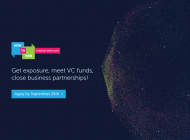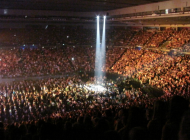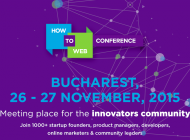“Tech skills have always been there in Romania, now business skills start to take some shape.”
Andrei Pitis, co-founder of Tech Angels and Innovation Labs
I compare Romanian startup ecosystem to a cocktail infused with strongly flavored ingredients, the one that is getting stronger with every week.
Image credit
In the end of November, I was in Bucharest on How to Web conference, the most important startup event in Romania. My personal goal there was to get a grasp of the country’s startup ecosystem, and since seeing and understanding a bigger picture requires distance, I’m ready to share my overview.
How to Web mirrored the current state of the industry, and I was able to take advantage of it quite efficiently interviewing those who are moving the Romanian entrepreneurship forward: startuppers themselves, local business angels and funds, foreign VCs and accelerators. The conversation with all of them helped to shape the vision of the local tech scene.
What’s going on now
Compared to the previous runs, the quality of startups pitching at Startup Spotlight competition went up, from ideas on PowerPoint slides a few years ago to [impressive] working prototypes and products with proven market fit this year. Just look at Scooterson, a smart kickscooter, Vector Watch, an upmarket brand of smartwatches looking like the real ones, or AxoSuits, the developer of exoskeletons to help people with walking disabilities.
Another change from a few years ago lies in the change of attitude towards failures associated with creating a startup. Now entrepreneurial risks and failure are more socially acceptable, and “startupmanship” is encouraged.
For the most part, it is the merit of a few big exits and success stories that raised the profile of Romanian entrepreneurs:
e-commerce solution for software vendors Avangate bought by the private equity firm Francisco Partners,
social analytics tool UberVU acquired by HootSuite,
document encryption service docTrackr bought by Intralinks,
navigation startup Skobbler acquired by Telenav,
video ad tech company LiveRail acquired by Facebook,
SaaS web form and survey builder 123Contactform received $1M in funding from Catalyst Romania,
MavenHut, a developer of social games, incl. Solitaire Arena for Facebook, got more than $500K investment from SOSVentures. Earlier this year, sold the rights for Solitaire Arena & Solitaire 3 Arena to RockYou for an undisclosed amount.
Worth noticing, that most of these companies get incorporated elsewhere, but their R&D units remain in Romania.
Another implication of these success stories is that the exited founders scout for tech startups to invest their money and product development expertise. Moreover, successful Romanian companies often become early adopters of new solutions offered by local startups. In the talk with Adriana Iordan, Avangate’s Chief Product Officer, I learned that the successful antivirus vendor Bitdefender was one of the company’s first clients, whose feedback helped in shaping the product.
The businesses mentioned in the list above had a potential for global expansion from day one, and most of them had graduated from a Western accelerator (UberVU – Seedcamp, docTrackr – TechStars Boston, MavenHut – Startupbootcamp Dublin). There are also locally successful startups with a potential for expanding in the region (Southern and Central Europe). Examples are Emag, FreeWifi, SmartDreamers, Vola.ro, 2Parale/2Performant.
Most of these are B2B SaaS startups, but there are also cool hardware companies: Vector Watch, Scooterson, AxoSuits, Tintag, Symme3D, uRADMonitor, Lighty.
If we talk about “specialization”, Romanian startups are more likely to spring up in the field of security, big data, ad tech and marketing tools, e-commerce, gaming.
Startups and outsourcing in Romania
In Romania startups and outsourcing are two very related realms. Geographically, most of them are based in Bucharest and Cluj Napoca. More and more tech companies appear in Timisoara, the 3rd populated city in the country. It is known for outsourcing, but also as a home to R&D units of several multinationals like Alcatel-Lucent, Siemens, Continental, Flextronics, Elster and many others.
Outsourcing companies are sponsoring startups events, and as it was noted by many of my interviewees, many large outsourcing companies invest in in-house startup projects or provide first-level financial/development support for innovative ideas of their employees. Fortech, a 450-people outsourcing vendor based in Cluj, has even established a fund Seed For Tech. Interested in B2B tech ideas, Seed For Tech is not a regular fund offering seed money and business expertise, but they are also ready to carry out the development effort for the chosen ideas. Another example is Gemini Solutions, a Bucharest-based software development shop with 100 employees, which created Gemini Foundry, that they call a “flexible accelerator”. The program supports teams with a scalable product idea, which will potentially appeal to the US market and investors. They promise business and technical mentorship, introduction to investors in Silicon Valley, as well as administrative support and office location.
Strong demand for outsourcing helped the vendors to pile some cash and reinvest it into building products. Some of these products turned out very successful – like Teamnet and Bitdefender, just to site a few.
Teamnet, an ICT integrator with more than 800 employees, invests heavily in SCADA and Robotics, and at How to Web they showcased their stylish Hirrus drones, which were already used for research and rescue projects.
Bitdefender, an antivirus software, used to be a company doing outsourcing orders. They had French customers 20 years ago, and they shipped the deliverables on … floppy disks. The floppies were sent back and forth, and sometimes they returned with infections, and they had to come up with a way to clean them. That’s how Bitdefender antivirus solution was born.
Another positive influence of outsourcing is that the employees of outsourcing vendors gain technical skills and get exposure to product development mindset while working for end-clients from Western Europe and the US.
Finally, I’d like to highlight a double effect that outsourcing has on the motivation of potential startuppers. Romanian engineers, working for outsourcing or at the offices of multinationals like Microsoft, IBM, Oracle and others, gain good salaries and can afford quite a lavish lifestyle, compared to the rest of the population. Obviously, this relative affluence makes it harder for them to get out of the comfort zone and to try building the very own startup. On the other hand, future entrepreneurs meet friends/co-founders while working for an outsourcing company, gain experience in developing products meeting the requirements of international clients, and save money for start-up capital and/or a financial cushion.
Startup ecosystem in Romania
If in 2010 Romania could boast about 10 product companies, nowadays there are more than a hundred, according to the estimates of Bogdan Iordache. Bogdan is the founder of How To Web and one of the key people forging the startup ecosystem in the country. Despite this positive trend, Romania still has far more project managers than product managers, and more events of How To Web kind and more success stories are needed to change this.
While speaking about Romanian startup scene, it is impossible not to devote the whole passage to Radu Georgescu, THE IT entrepreneur in Romania, founding partner of GECAD Group, mentor and investor. In 1994 his company GeCAD software developed RAV Antivirus, and in 2003 - with over 10M users - they exited it to Microsoft. In 2010, 83% of GECAD’s online payment solution ePayment - currently PayU Romania - was acquired by Naspers. Then, in October 2013, Radu sold Avangate, a solution that helps software vendors and online services companies selling online, to the US private equity firm Francisco Partners. In 2014 GeCAD Group sold Axigen Messaging, enabling businesses to create their own email servers, to Romanian entrepreneurs controlling IT integrators. Currently, GECAD group invests internationally between $1-10M in tech startups (and they have also gluten-free soups in the portfolio 🙂 with a potential for high-growth. Their latest investment of $2M went to Vector Watch, a sharp-looking smartwatch with a 30-days battery life, designed and developed in Romania.
Acceleration and Financing
I noticed that Romanian accelerators provide a good start for projects at the idea or MVP stage, so namely these are pre-accelerators. When the startup aims to scale and conquer international markets, they apply for programs in Western Europe, UK or in the US. Here’re the programs offered to the local young tech entrepreneurs:
- MVP Academy is a 7-weeks long program operated by How to Web in partnership with Telekom Romania and Bitdefender.
- The 2 months SprintPoint program in Cluj is aiming to help teams with an established idea to turn it into an MVP and to elaborate a monetization and scaling strategy.
- Spherik, an acceleration program started in 2014 and also in Cluj, has Radu Georgescu in the mentors’ list. They take π% (3.14%) in equity, applicable only if the startups gets funded or demonstrates certain performance within a year after Sherik’s program.
- Innovation Labs, founded by Vector Watch’s CEO Andrei Pitis, is a pre-accelerator accepting applications from students. It is supported by Orange and Microsoft.
Now we get to the most interesting part - the money. As mentioned above, founders who exited are a possible source, as well as outsourcers with “startup mentality”. As for more conventional startup funding opportunities, there are business angels - around 20 entrepreneurs - united in TechAngels association. They do 10-20 deals a year, and the average ticket is $100K, with the follow-up investment of up to $500K, swapped for around 15% of the company. Asked about the funding appetites of Romanian startups, a member of TechAngels Radu Atanasiu said: “Often our startups demand more money they can efficiently spend in 6-12 months, it’s like they all have in mind a magic number of $200K. We need to educate them about company valuation principles, and teach that it’s better to ask for a reasonable amount at first, and then, after the relationship with the investor was established, ask for follow-up funding.”
Radu Atanasiu predicts more syndicated deals in the next years since angels tend to bring their friends into the network. He also sees a vacant niche in the funding opportunities for Romanian startups. While there are angels writing checks of up to $100K and a few VCs offering up to $1m, there are virtually no seed funds.
To finish with the funding part, let me name international funds that invested in Romanian companies: SOS Ventures, 3TS Capital (via Catalyst Romania), Eden Ventures and Early-Bird Ventures.
Startups to Watch
If you are trying to spot gems on the Romanian startup scene, pay attention to the names I mentioned in this post and a few others: AxoSuits, Jaboo, Lighty, SafeDrive, Scooterson, Symme3D, Vector Watch, uRADMonitor.
Thank you note:
I’m very grateful to all the people who invested their time in talking to me during How to Web. They shared their views on Romanian tech scene and its perspectives, as well on its standing in the region. Below I’m listing those who weren’t quoted i the article, but without them, this piece wouldn’t have been possible
Mircea Vadan from Seed for Tech, Andrei Brasoveanu from Accel Partners, Alan Clayton from SOS Ventures,Todor Breshkov and Rumen Iliev from Launchub, Uldis Leiterts (co-founder of Infogr.am), Ivan Brezak Brkan from Netokracija, Olaf Lausen from Telekom Romania, Dan Berte from Bitdefender, Ott Vater from Estonian e-residency program.












